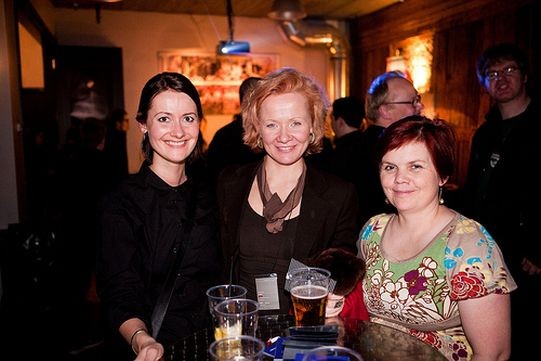|
Agents, managers and more The organisers of this year's festival, with the support of the Nordic Council of Ministers' Office in Estonia, invited the directors of music exporting agencies from the Nordic countries to attend the event in Tallinn: Paulina Ahokas from Finland; Anna Hildur Hildebrandsdottir from Iceland; and Anders Hjelmtorp from Sweden. The experts presented their countries' strategies and support systems in the marketing of music. In addition to exporters, the festival also attracted Nordic agents, managers, radio station representatives and more. Everything starts with education, the experts stressed, mentioning studies of economics and obtaining experience more broadly. In Tallinn Music Week they saw a versatile and well-developed brand in which to invest and which forms the perfect platform for exporting music from Estonia and the other Baltic States. Ahokas, Hildebrandsdottir and Hjelmtorp said that what is needed now is a single marketing plan for all three countries to enter foreign markets, since individually this would prove too costly. They agreed that an event like Tallinn Music Week alone, however successful, would not be enough, and that attention should also be turned to promoting the nations and their cities themselves. The Nordic music exporters agreed that the music industry is a very risky one: as little as a quarter of investments can pay off. At the same time, their discussion showed that support for the Swedish music industry, for example, is primarily directed at making a profit. Hildebrandsdottir nevertheless noted that music as a form of cultural promotion is difficult to put into numbers that everyone interprets the same way, since it brings a lot more money into a country than it may at first appear to. Valuable lessons Helen Sildna, the founder and chief organiser of Tallinn Music Week, explained that the Nordic countries were the focus of the festival's attention because Estonia's creative and music industries have so much to learn from them. The festival already involves a number of partnership projects within the Nordic music industry. One is the online Nordic-Baltic Knowledge Forum launched by Denmark's showcase Spot Festival, where specialists from the music and creative industries can debate important issues in their fields. A talent exchange programme is also under development with showcase festivals in Denmark, Norway and Finland. The Nordic countries, led by Iceland, are currently planning to create a network of Nordic-Baltic creative economy business models this autumn. The network should consolidate and improve cooperation between creative companies in the region. The creative economy is one of the priority areas of the activities of the Nordic Council of Ministers in a globalising world, where culture helps to preserve what is unique and to enliven economies. Design, fashion, food culture, tourism, music, cinema, media, the virtual world, festivals, theatre and literature all represent the creative economy to the Nordic region. |
Nordic countries and Baltic States to work together to boost music exports
|
Tallinn Music Week 2010, which drew musicians, exporters and music lovers to the Estonian capital for the second time, is designed to showcase the work of artists from Estonia (as well as the other Baltic States), to put them in the international spotlight and to promote the exporting of music in general. Estonian President Toomas Hendrik Ilves thinks so highly of the festival – which has rapidly earned great international acclaim – that he found time in his busy schedule to open this year's event with a welcoming video. 18 concerts, 100 artists, 6000 fans, more than 100 foreign guests from 17 countries and 30,000 website hits from 74 countries speak for themselves. |

 Music experts from the Nordic countries and Baltic States are looking to enliven the creative industry in the region this spring. As part of this year's very successful Tallinn Music Week, music agency managers discussed how they could take their cooperation to the level of the Northern Dimension Partnership so as to better promote and make a greater profit from the region's music.
Music experts from the Nordic countries and Baltic States are looking to enliven the creative industry in the region this spring. As part of this year's very successful Tallinn Music Week, music agency managers discussed how they could take their cooperation to the level of the Northern Dimension Partnership so as to better promote and make a greater profit from the region's music.